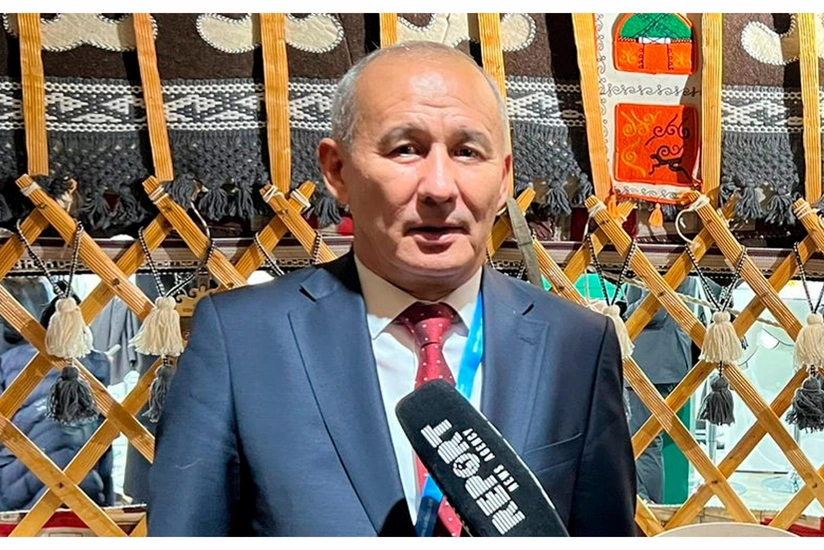Minister: Kyrgyzstan's participation in COP29 opens access to investments for environmental projects
- 13 December, 2024
- 08:58

The UN Climate Change Conference (COP29) in Baku became an important milestone in the global climate change agenda. It emphasized the need to strengthen international cooperation to achieve climate goals, particularly the implementation of the Paris Agreement. Special attention was paid to financing climate initiatives, adapting to changing climate conditions, and protecting ecosystems.
Meder Mashiev, minister of natural resources, ecology and technical supervision of the Kyrgyz Republic, shared his assessment of the conference results in an interview with Report. He also discussed what prospects and opportunities the COP29 decisions open for Kyrgyzstan.
- How do you assess the results of the UN Climate Change Conference (COP29) held in November in Baku?
- The COP29 Conference in Baku was an important event in the context of global climate change efforts. Key decisions were discussed and adopted, aimed at strengthening measures to reduce greenhouse gas emissions, adapt to climate change, and maintain ecosystem resilience. The agreements reached represent a significant step forward as they strengthen international cooperation and demonstrate countries' real commitment to implementing the Paris Agreement and achieving sustainable development goals. Importantly, the discussed topics included climate finance initiatives, which is directly relevant for developing economies like Kyrgyzstan. The agreements reached on climate financing, including increasing its volume for developing countries to 300 billion USD by 2035, open new opportunities for Kyrgyzstan. The increase in climate investments will improve access to funds for implementing national climate and environmental projects. Kyrgyzstan can actively participate in programs to attract these funds for implementing national projects, including creating infrastructure for sustainable development and protection against climate threats.
- Which COP29 decisions may have the greatest impact on Kyrgyzstan's environmental policy development?
- The main decisions adopted at COP29 concern increasing ambitions to reduce greenhouse gas emissions and strengthening financing mechanisms and support for climate change adaptation. For Kyrgyzstan, particularly important issues include developing green energy, increasing agricultural resilience to climate change, protecting water resources, and improving natural ecosystem management. We plan to integrate these decisions into our national climate policy as part of preparing NDC 3.0.
- How, in your opinion, will the results of COP29 affect global efforts to reduce greenhouse gas emissions and mitigate climate change? What benefits can Kyrgyzstan receive from participating in these initiatives?
- The results of COP29 should lead to strengthened global efforts to reduce greenhouse gas emissions, which in turn will help slow down climate change. Importantly, COP29 emphasized the need for more ambitious and effective actions. By participating in these initiatives, Kyrgyzstan can receive several benefits, including access to international climate finance, technical assistance in developing clean technologies, and enhancing its role as a participant in global climate processes. This will help us accelerate the transformation of our economy towards sustainable development and increase resilience to climate risks.
- What are the main challenges for Kyrgyzstan in implementing COP29 decisions?
- These are primarily limited resources for implementing large climate projects and the need to improve the qualifications of specialists in climate policy and green technologies. To overcome these challenges, we are actively working with international partners to attract grants and investments, as well as strengthening internal mechanisms for preparing and implementing effective climate strategies. It is important to develop cooperation with neighboring countries in the Central Asian region to exchange experience and develop joint initiatives.
- What role can Kyrgyzstan play in implementing regional climate projects initiated or supported under COP29?
- Kyrgyzstan, as a mountainous country with rich natural potential, can play an important role in implementing regional climate projects focused on sustainable ecosystem management, green energy development, and transboundary environmental cooperation. We see great opportunities for cooperation with Central Asian countries, especially within regional programs and initiatives. For example, in implementing the Regional Strategy for Climate Change Adaptation and others. Central Asia must unite efforts to address common environmental challenges, which will open new horizons for effective interaction. It's important to create joint regional programs and mechanisms that will enable effective use of financial resources, knowledge and technology exchange, and enhance the region's preparedness for changing climatic conditions. Kyrgyzstan, through its active participation in international forums like COP29, can demonstrate leadership in nature conservation and sustainable development, securing a strategic position in future climate initiatives in Central Asia. Strengthening cooperation on climate issues will bring not only environmental but also economic benefits for the region's countries, opening new horizons for joint development.
- How is Kyrgyzstan working to strengthen its international image as an environmentally responsible state?
- Kyrgyzstan's participation in COP29 has helped strengthen our international image as a country actively working to address climate change and environmental protection. We have demonstrated commitment to sustainable development principles and are ready to contribute to global efforts in combating climate change. Holding side events at COP29 was crucial in demonstrating progress made since COP28, both in advancing the mountain agenda and supporting the Mountain Declaration. Clearly, the relevance of mountain regions in the climate agenda is increasing thanks to significant efforts by Mountain Partnership members and governments, including Kyrgyzstan.
